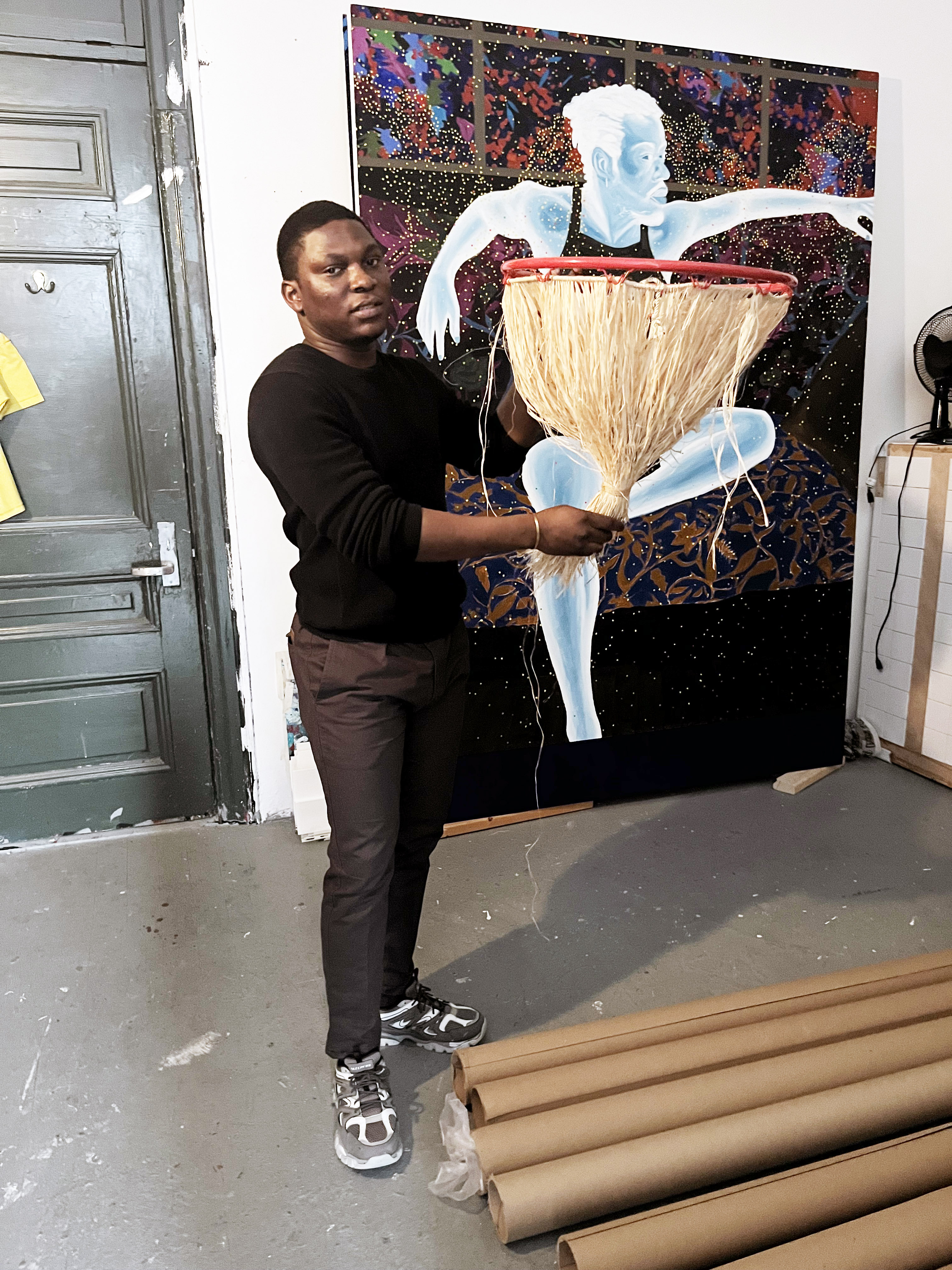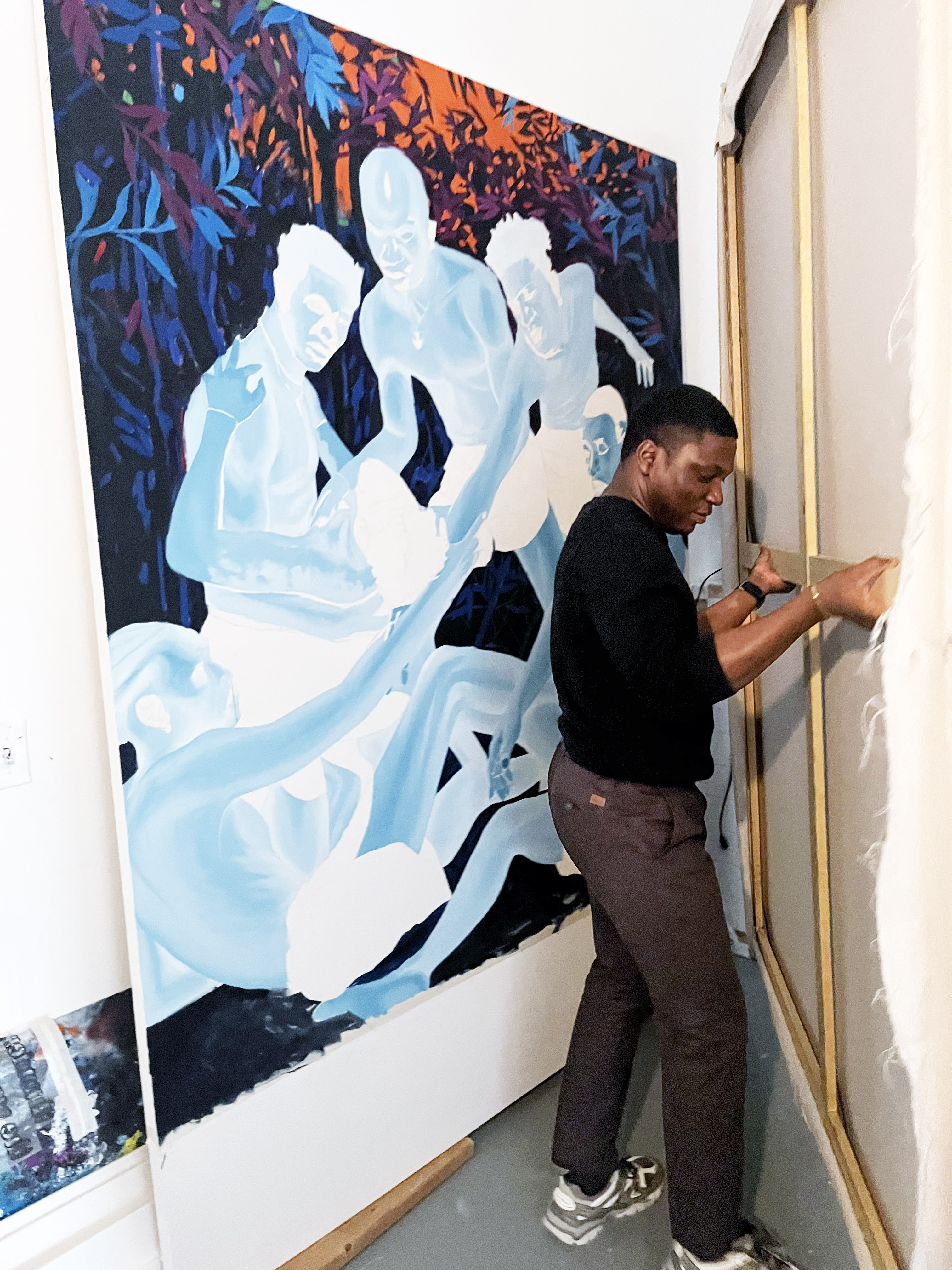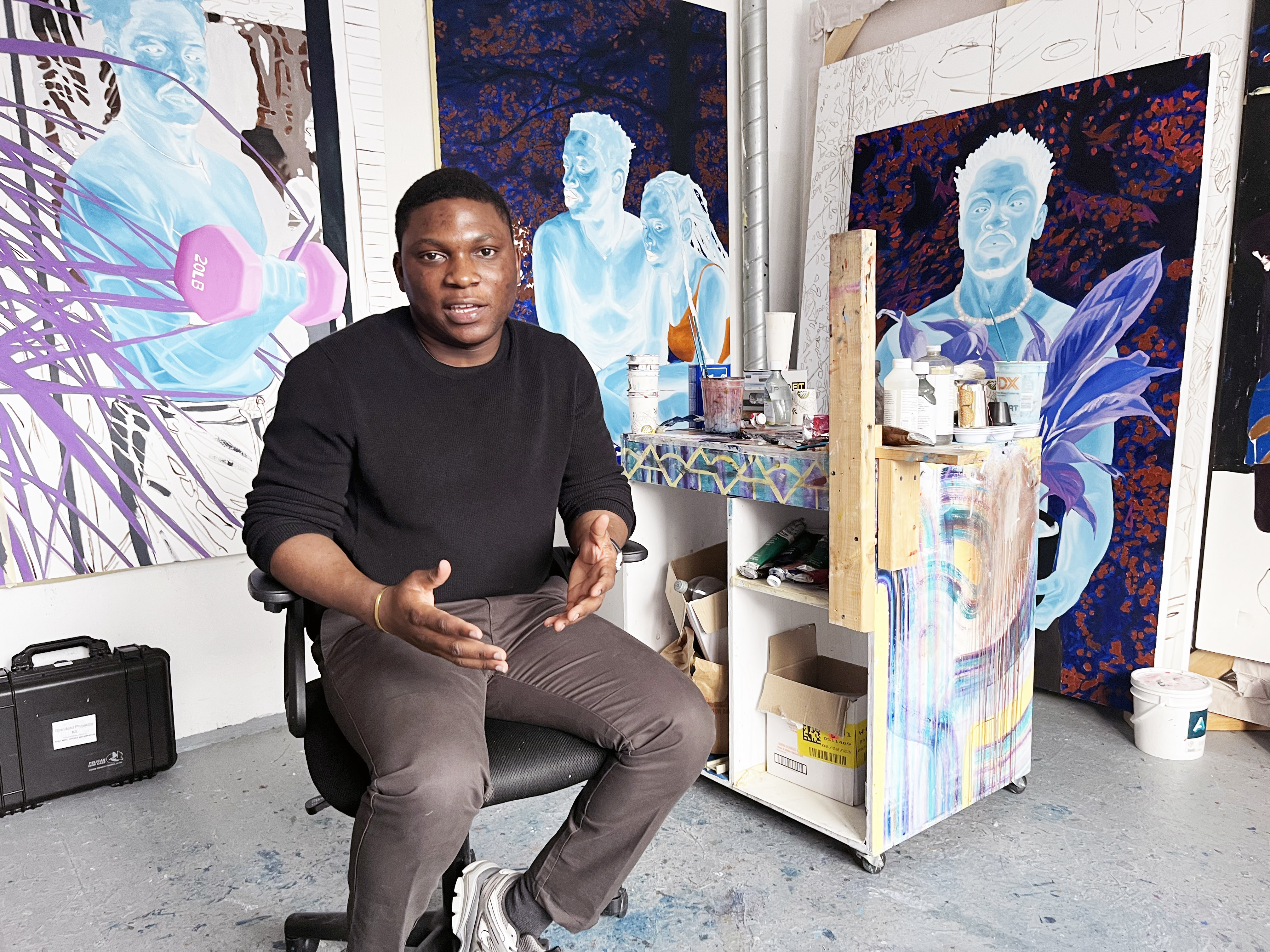Boluwatife Oyediran
Kobe Jackson
→MA GAC 2025
Boluwatife Oyediran
→MFA PT 2024
April 8, 2024, 5:45 PM:
My buzz from the eclipse lingers as the sun shines low on the horizon, sending a warm light into Boluwatife’s third floor studio in Fletcher Building.
Favorite tool: mitre saw, ’cause he likes building stuff with lumber.


All images taken on site by Kobe Jackson
KJ Was the eclipse a life-changing experience for you?
BO Not really. I witnessed it once, in 2006, in Nigeria. I just needed to experience it again and see what that means for me, to experience the eclipse in America.
KJ Do you know what it meant for you?
BO I guess I do. I could make a painting about the eclipse, my paintings are already about darkness so I see a connection there. What I find interesting about what happened today is that you can look at the eclipse with raw eyes and not see it. You know that it’s getting dark around you, but when you look at the sun it’s still there shining brightly. So you need a filter to really see it. That connects to the way I use the inversion filter on Photoshop to scan and then visualize the inverted experience of Black immigrants in America.
KJ In what ways do you think that the experience of Black immigrants is inverted?
BO I refer to the definitions of inversion to think about experience. And one of the definitions is “a change in the order of something.” I think about my experience living in America and the change in the order of how I used to live and experience life generally. It’s a whole different kind of reality.
KJ What are the most extreme versions of change that you’ve experienced?
BO The first would have to do with where I live. When I arrived in America, a basement apartment awaited me. People don’t live in basements in the part of Africa where I came from. One might say that “it’s just a basement apartment—that it doesn’t mean anything,” but that’s a way of saying architecture does not matter. The quality of our livelihoods is shaped by the kind of homes we live in.
KJ What was your living space like back where you came from?
BO The last home I lived in was in Ghana, and it sat on the West African coast of the Atlantic Ocean, so the ocean was right outside my window. I always had to keep my windows closed because the air was kind of salty and that affected stuff in my house. In my bedroom, every morning, as early as 6 AM, the sun woke me up because my window opened to the east. Here in America, I never know what’s going on until I step outside and see. Oh, ok, it’s raining, I have to go back in and get my umbrella. Or, oh, it’s snowing.
KJ How did the basement apartment inform your work?
BO Living in that apartment allowed me to embrace darkness. When I discovered the inversion, I understood immediately that one of the ways I could make the inversion interesting was to depict the luminosity that comes with the inverted image of the Black person in a dark environment.
KJ It sounds like you turned this negative experience into something really generative. Do you feel like living in this basement apartment was good for your practice? Or do you hate it?
BO At the moment, I’m not sure. The apartment is good, and when I saw it for the first time, I thought it was better than the apartment I had in Ghana. The only thing missing was access to the surrounding world.
KJ You’re graduating soon, do you know where you’re going to go?
BO I intend to rent a loft space here in Providence, where I can live and paint for the next year.
KJ So you’ve been selling your work?

BO Yeah, sometimes.
KJ Is it through collectors directly, or galleries, or multiple galleries?
BO Presently, to collectors. In the past, galleries.
KJ Do you feel like selling your work has pressured you to keep working in the same style?
BO Yeah, but also not selling, too. There was a time when everything was going okay in my career; some people liked the paintings I was making, but I didn’t connect with them anymore so I switched my style. Then people were like, this guy’s dumb, why would he do that? But I was fortunate to have some people who understood that I was still in my emergent phase, that I was still finding my voice.
When I think about the Black immigrant experience I’m making work about now, I think it’s a less talked about issue in the canon of Black figuration. People make paintings about the Black American experience, like Black Lives Matter, etcetera, but we don’t have works that specifically focus on the Black immigrant in America. That’s where this narrative fits in uniquely and potentially.
KJ So, you don’t feel any pressure to keep painting in this style?
BO Yeah, I don’t feel that pressure. But also, if you don’t stick with something for a period of time, you’ll not be able to find out more about it. It’s like digging up gold, you can’t give up too early. Maybe what I’m doing now is preliminary to something yet to be discovered.
KJ How do you feel about art school? Do you feel like you got what you wanted out of it?
BO I think I’ve gotten what I set out to get, but it wasn’t given to me, it’s what I’m currently doing in my practice. I’ve been through frustrating moments in the course of my studies, and reading was one of those things that greatly helped me. One of the readings that liberated me was “Young Artist to Be” by Kerry James Marshall. You can find it in the catalogue for his show, Mastry.
KJ What do you think of the narrative of the tortured artist? Do you think it’s true? Do you think tortured artists produce better work?
BO No, I don’t believe tortured artists produce better work, but I think that the torture they go through helps them in some way. It’s just the way we live life. Life is harder for some people. Some people get things on a silver platter, and some have to go through fire to be able to get the same thing. It’s the same way for creatives.
KJ What kind of risks do you like to take in your practice?
BO Selling my work is a risk. I’m worried about surfacing at auction very early in my career.
KJ What are you hoping to discover or achieve through the process of making all of these paintings? Because you’re making a lot of paintings.
BO I want to make a lot more! I can’t wait to graduate so I can jump into the things I want to jump into. What I desperately want to do now after grad school is seek out African immigrants who are living here in New England, and who are contributing positively to their communities. I want to hear their stories and document them through paintings.
KJ If you had to write a story about the backgrounds in your paintings or the environment, what kind of mood or world is that?
BO I’m thinking about the darkness in my apartment, and the brief darkness we experienced today, the solar eclipse. Also, in a metaphoric way, thinking about America as a dark place, because there are things happening here that I did not expect. I was surprised when I first saw a homeless person here lying on a street. The type of darkness that is not atmospheric but that explains, in a way, that this place is not paradise.
Boluwatife Oyediran is a Nigerian visual artist.
Kobe Jackson is a gl;t(h conno•~seur.'